Iran-US Proximity Talks In Qatar Ends With No Progress - EU Envoy
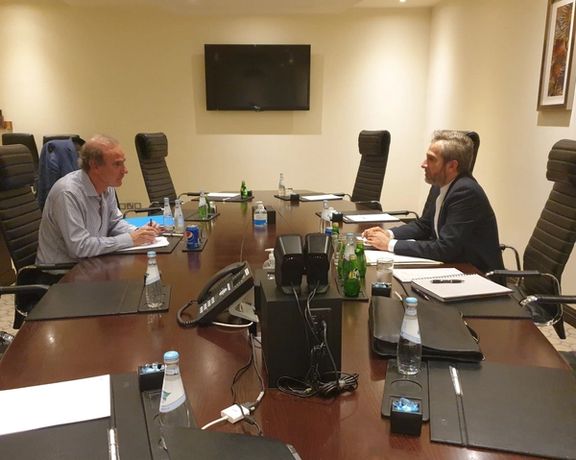
Indirect talks between Tehran and Washington in Qatar to resolve remaining issues in negotiations to restore the landmark 2015 nuclear pact ended without progress.

Indirect talks between Tehran and Washington in Qatar to resolve remaining issues in negotiations to restore the landmark 2015 nuclear pact ended without progress.
Calling the proximity talks “two intense days” of negotiations, EU's envoy Enrique Mora tweeted Wednesday evening that “Unfortunately, not yet the progress the EU team as coordinator had hoped-for. We will keep working with even greater urgency to bring back on track a key deal for non-proliferation and regional stability.”
It is not clear whether there might be a further round, while Tehran and Washington have yet to comment on how the talks have progressed, or what they expect next.
Moreover, Axios quoted an unnamed US official as saying that "The Iranians have not demonstrated any sense of urgency, raised old issues that have been settled for months, and even raised new issues that are unrelated to the 2015 nuclear agreement.”
According to the source, “A deal has been available for some time. If there is a side that needs to take a decision, it’s them — and it’s been them for months."
Earlier in the day, Tasnim news agency, with links to the Revolutionary Guards, reported that the Tehran-Washington nuclear talks in Qatar had ended without agreement, a claim quickly rebutted by the foreign ministry.
Tasnim said the American side refused to give "guarantees for Iran's economic benefits” from the deal.
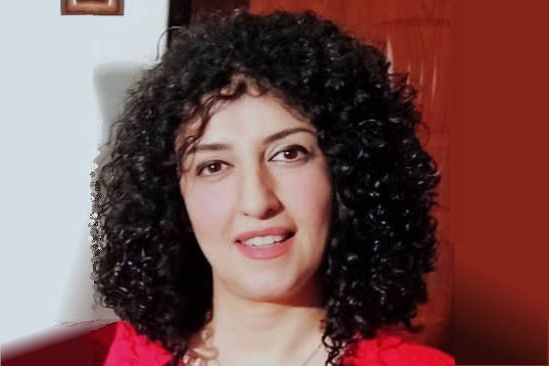
Amnesty International says Iran is torturing prize-winning rights activist Narges Mohammadi by denying her proper healthcare in reprisal for her campaigning.
The rights group said Tuesday that Mohammadi, who suffers from lung and heart conditions, was taken to the infirmary of the notorious Qarchak women's prison on June 23 after experiencing shortness of breath and an irregular heartbeat. (https://www.amnesty.org/en/documents/mde13/5775/2022/en/)
Health and sanitary conditions at Qarchak, located forty kilometers to the south of the capital Tehran, are very poor in comparison with prisons such as Evin where most political prisoners and prisoners of conscience are usually held.
Since her return to prison from hospital, prison authorities "have been denying Mohammadi some of her required medication,” Amnesty added.
Her husband Taghi Rahmani, who is based in Paris, accused the prison authorities earlier this week of deliberately withholding medication sent by her family to treat a lung condition.
In a five-minute trial in late January, she was sentenced to eight years in jail and 70 lashes by Branch 26 of the Revolutionary Court, on trumped-up political charges.
Mohammadi, who was arrested in November last year, has been to jail several times over the past two decades. She was freed from Evin Prison in September 2020 after serving more than five years when she had no contact with her husband and children for long periods of time.
Persecution of human rights and political activists and executions have increased since hardliner president Ebrahim Raisi took office last August.
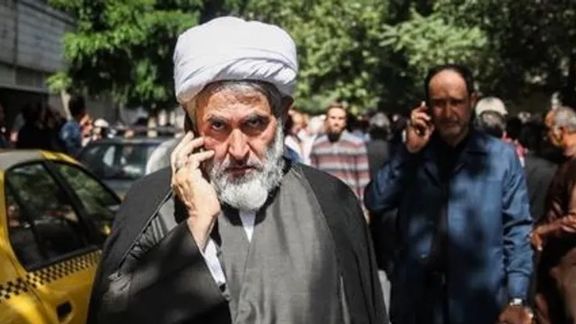
In another apparent twist at the top of Iran’s Revolutionary Guards, the New York Times claimed Wednesday that Brigadier-General Ali Naseri was arrested a month ago.
The Times was vague on Naseri’s position in the Guards (IRGC) and how it related to the removal last week of Hossein Ta’eb, the Guards (IRGC) intelligence chief, in the face of disquiet in senior circles over Iran’s response to a covert Israeli campaign.
Iran International has reported disquiet among top ranks over intelligence failures demonstrated by the May 22 assassination of IRGC Quds (Qods) Force colonel Hassan Sayyad in Tehran, while state media has also implied that the deaths of two aeronautical staff in late May and early June were suspicious.
The New York Times quoted Keren Hajioff, senior advisor to Israeli prime minister Naftali Bennett, that Israel was following a “new tactic” based on Bennett’s ‘Octopus Doctrine.’ The advisor said: “Now we go straight for the head,” instead of IRGC’s proxies in the region such as the Lebanese Hezbollah.
The paper cited an unnamed Israeli official that “part of the strategy entailed exposing failures by the Revolutionary Guards in their covert war with Israel in the hope that it would create conflict between political leaders and the defense and intelligence establishment.” Rivalries within the IRGC – with Esmail Ghaani (Qaani), head of the IRGC extraterritorial Qods Force, and Esmail Khatib, intelligence minister, critical of Ta’eb – would suit the Israelis’ approach.
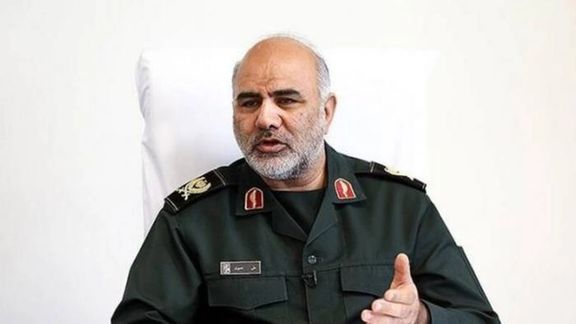
The Times described Naseri as “a senior commander in the Revolutionary Guards’ Protection of Information Unit, tasked with oversight and supervision of the organization’s work,” although the paper sourced this to an April 21 2019 story from Radio Farda that Naseri had been replaced in that position. The Iranian Students News Agency also reported at the time that Naseri had been removed.
‘Criminal media networks’
Two months later, on June 11, 2019, IRGC spokesman Ramezan Sharif addressed what he called rumors of the arrests or fleeing of commanders. These were efforts by Iran’s enemies to cause disruption through “criminal social media networks and media.”
Sharif insisted that three individuals named in various websites – taken to mean Naseri, Mohammad Tavalaee, and Mostafa Rabiee – were “active in new positions” and were “seriously performing in their missions and carrying out their duties,” with some of their public appearances reported in Iranian media.
There had been suggestions at the time that Naseri had fled the country, with the Washington Free Beacon claiming he had defected to an Arab state in the Persian Gulf taking with him secret documents.
The 2019 reports of Naseri’s dismissal came the day before Supreme Leader Ali Khamenei appointed General Hossein Salami as overall commander of the IRGC and two weeks after then US president Donald Trump added the IRGC to the US list of ‘foreign terrorist organizations.’
It remains unclear what position Naseri occupied prior to his recent alleged report. If he had been replaced in 2019, how he could have been trusted with another sensitive post?
So far, three key IRGC intelligence and security figures have been replaced and Ta’eb’s ally, parliament speaker Mohammad Bagher Ghalibaf is being attacked by some hardliners for corruption, an allegation widely believed to be true among Iranian observers who have followed him through his military and political career.
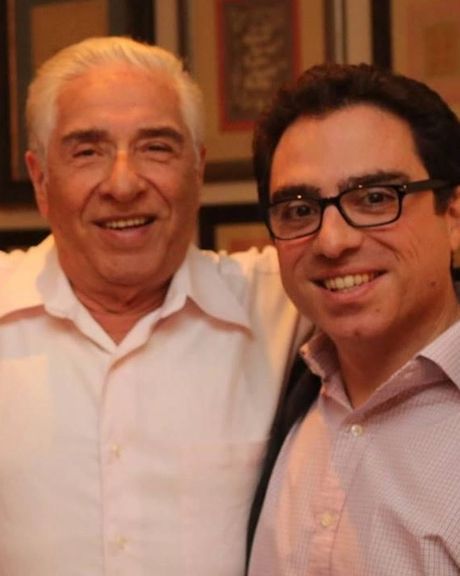
Jailed Iranian-American businessman Siamak Namazi has called on President Joe Biden for efforts to release him and other American citizens, asking him to “End This Nightmare.”
In a guest essay for the New York Times written "while caged in Iran’s notorious Evin Prison,” the longest-held Iranian American prisoner said Wednesday “the Biden administration’s approach to rescuing Americans in distress in Iran has failed spectacularly so far and unless the president intervenes immediately, we are likely to languish in this abyss for the foreseeable future.”
He said he was handed a 10-year sentence for speaking at university conferences and having a connection to the World Economic Forum, which the judge ruled as “tantamount to attempting to overthrow the regime in collaboration with a hostile foreign government -- meaning the United States.”
He said Iran frees its captives only if offered sufficient incentives, adding that “Tehran seems to be demanding more for our release than the White House can stomach.” “Mr. Biden, I implore you to put the lives of innocent American detainees above Washington politics.”
Namazi has been in prison since October 2015 on vague charges of collaboration with a foreign government. After Siamak’s arrest, his 84-year-old father, Bagher Namazi, a retired senior UNICEF official, traveled to Iran in 2016 to help him but he was also arrested and jailed in 2017 on obscure accusations.
Tehran is accused of detaining foreigners and dual nationals on trumped up charges to use them for getting concessions.
Namazi made the plea as Tehran-Washington indirect nuclear talks are underway in Qatar.
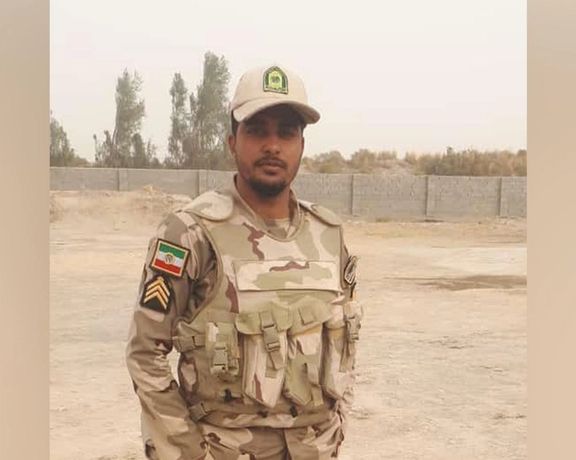
Conflicting reports surround the death of an Iranian soldier who was killed at the border with Afghanistan, while Tehran has urged the Taliban for justice for those behind the incident.
In a statement on Wednesday, Iran’s new foreign ministry spokesman Naser Kanani said Mohammad Sayyad died in line of duty by unknown gunmen at the Milak border crossing in Iran’s southeastern province of Sistan and Baluchestan on Tuesday.
Other reports say that the young border guard was killed in clashes with the Taliban.
Citing local sources, Afghanistan’s Hasht-e-Subh Daily said he was killed when a skirmish broke out after Taliban forces entered Iran "following the killing and wounding of two Afghan boys by Islamic Republic border guards."
Kanani said an investigation has been launched into the case and more details will be made public as soon as they are verified.
Iran’s official news agency IRNA said that the border guard was killed in clashes with armed outlaws who wanted to enter the country from Afghanistan.
Meysam Barazandeh, the governor of the Iranian border town of Hirmand, rejected reports that two Iranian border guards have been also captured by the Taliban.
In April, the border crossing Dogharoon was temporarily shut down following a “dispute” between Iranian and Afghan border guards.
There have been some incidents at the border since the Taliban seized control of Afghanistan last year. An Iranian foreign ministry official in January said that the reason for clashes between Iranian forces and the Taliban was lack of professional conduct by the latter.
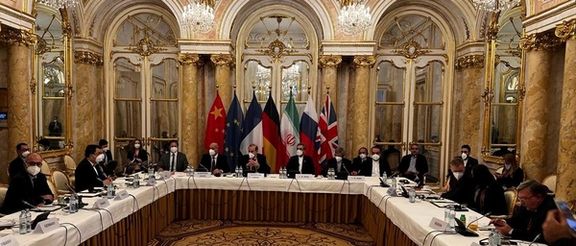
Revised version- Iran’s foreign ministry quickly rebutted a report Wednesday that Tehran-Washington nuclear talks in Qatar had ended without agreement.
The official news agency IRNA also weighed in, saying meetings were continuing and would end as planned today. It criticized un-named media for suggesting the negotiations had failed.
The talks at the Intercontinental hotel, Doha, were announced at the weekend and had been expected to last two to three days. It not clear whether there might be a further round. Tehran and Washington have yet to comment on how the talks have progressed, or what they expect next.
The meetings in Qatar have been coordinated by Enrique Mora, the senior European Union official who chaired the Vienna talks between Iran and six world powers aimed at restoring the 2015 Iran nuclear deal, which paused without agreement in March.
Mora has acted in Doha as a go-between in what EU foreign policy chief Josep Borrell dubbed ‘proximity talks,’ a format required by Iran’s refusal to talk face-to-face. Mora met Tuesday with Ali Bagheri-Kani, the deputy foreign minister leading the Iranian team, and separately with Robert Malley, the White House special envoy for Iran.
Tasnim’s account
In citing an “informed source” that the talks had failed, Tasnim, which is affiliated to Iran’s Revolutionary Guards, blamed US intransigence. “What prevented the talks reaching a positive result” was the US failure to offer “assurances over Iran’s economic benefits from a deal,” which for Iran were “red lines.”
Tasnim said US negotiators had insisted on a draft American text presented in the seventh round of discussions – back in December 2021 – in the year-long Vienna talks.
The agency’s report made no reference to the US listing of the Revolutionary Guards (IRGC) as a ‘foreign terrorist organization.’ Tehran’s demand for revoking the listing, made by President Donald Trump in 2019, was reportedly a central, unresolved issue in the stalling of the Vienna talks.
Attempts in the Vienna process to revive the 2015 deal (the JCPOA, Joint Comprehensive Plan of Action) struggled to agree on which US sanctions introduced since Washington left the nuclear agreement in 2018 violate the JCPOA, which offered Iran access to world markets without “discriminatory regulatory and procedural requirements in lieu of the sanctions.”
Tasnim criticized US President Joe Biden for “weakness and inability to make the decision that a restored JCPOA needs only US acceptance of Iran’s red lines over economic benefits.” The agency claimed Mora had criticized the US over the stance it was taking.